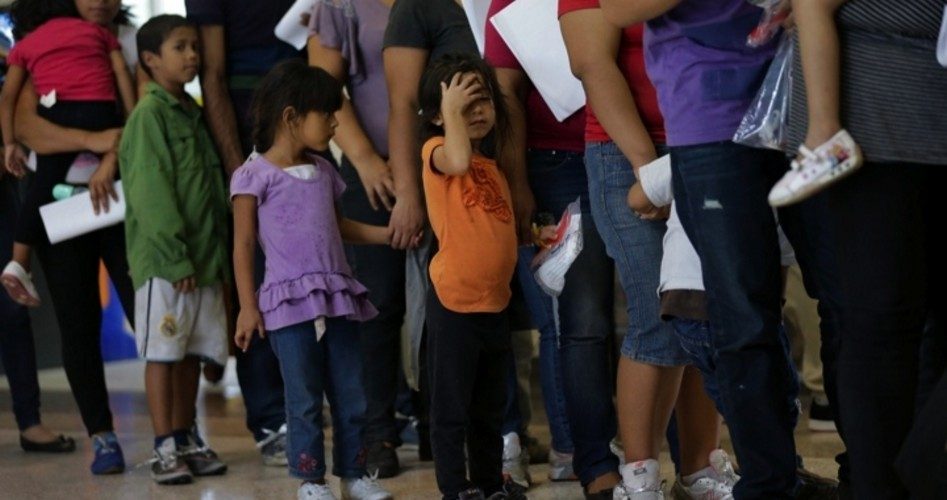
Gov. Bill Haslam of Tennessee protested in a letter to President Obama that no one in his state government had received notice that 760 of the estimated 50,000 unaccompanied minors who have entered the country illegally in the past several months have been sent to the Volunteer State.
“It is unacceptable that we became aware via a posting on the HHS website that 760 unaccompanied children have been released by the Office of Refugee Resettlement to sponsors in Tennessee without my administration’s knowledge,” Haslam wrote in his July 25 letter to the president. “Not only was our state not informed prior to any of the children being brought here, I still have not been contacted and have no information about these individuals or their sponsors other than what was posted on the HHS website and subsequently reported by media.”
Haslam reminded the president, “This influx of immigrant children could have a significant impact on state and local governments.” The state needs to be informed “prior to any additional unaccompanied immigrant children being released in Tennessee,” the governor wrote, while seeking “immediate answers” to the following questions about the children already sent to his state:
1. What was the process for determining that these children should be released to sponsors in Tennessee?
2. How did you locate and evaluate the fitness of their sponsors?
3. What medical screenings were the children given prior to their release in Tennessee?
4. What is the official immigration status of these children and their sponsors?
5. In what localities are these children now residing?
6. What are the legal requirements concerning the provision of services for these children while they are in the state?
7. What additional information is available on these children, such as age and health status?
8. How long will these children be in Tennessee?
Haslam expressed particular concern about the impact the additional youngsters might have on local school systems and the ability of administrators to plan for them:
The start of school is approaching for many districts across the state, and the federal government’s actions have caused great uncertainty around this issue.
I appreciate your attention to this matter and look forward to receiving a response to these urgent questions.
The governor sent a copy of the letter to Health and Human Services Secretary Sylvia Burwell.
As of Wednesday morning, the governor had not yet received a reply, a member of his staff said. A spokesman for the Department of Health and Human Services told the Wall Street Journal that the department is required to protect the privacy of the unaccompanied children and keep their personal information confidential.
Five other governors signed a letter to the president last week expressing similar concerns about the impact the relocation of the illegal immigrant minors will have on their states.
“We are concerned that there will be significant numbers who will end up using public schools, social services and health systems largely funded by the states,” said the letter signed by Governors Robert Bentley of Alabama, Scott Walker of Wisconsin, Sam Brownback of Kansas, Pat McCrory of North Carolina, Tom Corbett of Pennsylvania, and Gary Herbert of Utah. The governors said they were troubled to learn that the federal government is not requiring that relatives who are taking in the children be citizens themselves.
“This raises real questions as to whether these children will maintain appropriate contacts with our legal system and will follow necessary procedures designed to protect both them and the American public,” the governors wrote. Nearly half of the immigrant children who are sent to live with relatives fail to show up for immigration proceedings, they said. While federal law allows the immediate return of Mexican and Canadian children caught crossing the border illegally, those from other countries are entitled to deportation hearings. In each of the last five years, between 23,000 and 47,000 were apprehended, including Mexicans, the Wall Street Journal reported. Some have won the legal right to remain in the United States, while others never show up in court. Still others see their cases delayed for months or even years because of the backlog in the courts. In fiscal year 2013, immigration judges ordered only 3,525 migrant children to be deported, according to Justice Department figures, while another 888 were allowed to voluntarily return home.
“They’re here, and they’re staying, and whatever else might happen to them is at least a year or more away,” Doris Meissner, a former Immigration and Naturalization Service commissioner, told the Journal. “Until people’s experience changes, more are going to continue to come, because they’re achieving what they need: safety and reunification with their families.”
In the meantime, problems facing municipal officials and school boards include not only the number of migrant children that may be placed in their school districts, but the language barriers they bring with them. Since most of the latest arrivals are said to be from the Central American countries of Guatemala, El Salvador, and Honduras, few are likely to speak or understand English. Many are even illiterate in Spanish, “requiring ramped-up remedial Spanish lessons before they can be taught English,” Richard McKenzie, a senior fellow at the National Center for Policy Analysis, wrote in an article for National Review. And border guards are encountering foreign nationals from Bangladesh, Sri Lanka, and Nepal, according to a Breitbart News report.
Many of the “border children” are being sent from temporary shelters into foster homes, wrote McKenzie, putting further pressure on an already strained foster-care system. “If the flood continues unabated, the foster-children population could increase by 25 percent within the next year. The caseloads of already-overburdened social workers will rise, meaning that each caseworker will have more foster families to supervise and will be able to monitor each family less frequently.” Eligibility and care standards will likely deteriorate, he predicts, while the number of group homes and orphanages will surge, at “substantial prices.” School and care at orphanages in North Carolina, he notes, costs up to $54,000 per child, “if the children don’t have emotional and behavioral problems.”
“Politicians and pundits have treated the immigrant-children crisis as a sad story for the children who cross the Texas border,” McKenzie wrote. “If tens of thousands of the children are allowed to stay, it could be an even sadder story for American foster-care kids who will be forced to the front lines of the immigration war.”
Photo of illegal immigrants waiting in line at a bus station: AP Images




